 |
|
|
|
Full Event Report - Long Read - Further Updates to come!
Following the first CWU NW H&S event which was held in July 2022, CWU Health and Safety Forum in the North West, followed this up with an equally successful event held today, 11th April in Manchester's Mechanics Institute. were some 70 Union Safety Reps and Mental health First Aiders gathered to watch presentations from guest speaker, including from the Union's new national officer, Jamie McGovern, the first ever Health & Safety Policy Officer, Central Services. The above photo shows the moment when speaker Tony Dunbar, CWU member, completed his very emotional and honest presentation detailing his battle with depression with the support of the Union's Mental health First Aider, Jamie McGovern. Tony's paintings help towards his maintaining his daily struggle with his mental health. More details appear later in this news report of the event. In order to make this a second event successful, the North West Region's H&S Forum officers worked with CWU's North West Regional Secretary, Carl Webb to deliver a second excellent conference, unique to the North West and, once again, making it a leader within the CWU on health & safety in supporting the Union's Safety Reps, in their development, and their being pro-active in addressing issues with the employers; and putting health & safety at work at the forefront of the Union's priorities.
There were a number of new USRs present, including Ellie from a tech section of CWU - Union Of Tech and Allied Workers (UTAW) Unionsafety took the opportunity to interview her. It became clear that she sees Health & Safety as a good recruitment tool, and that given the concerns of young people within her industry, she sees it as a major tool to use. You can watch the interview with Ellie by clicking on her photo in Jamie McGovern's presentation report below. Guest speakers for the day, included new MP for Knowsley in Merseyside, Anneliase Midgley and Janet Newsham, Greater Manchester Hazards, Jamie McGovern, CWU National Officer, Miranda and Frieda, Heat Strike, plus Derek Maylor and John Fanagan of Merseyside Asbestos Victims Support Group. Unfortunately, web editor, Chris Ingram had a couple of technical issues which could not be overcome on the day, resulting in a lower quality video recording of the event. Apologies are made on bended knee! For this reason the report below provides audio transcriptions of the videos, where possible.
Nevertheless, following the day's timetable, here is the record of the day's presentations and audience participation: The event was opened by John McMurray and Mark D Holt, Lead Officer to the CWU North West Heath and Safety Forum. Welcoming the 70 plus Union Safety Reps to the event, John provided details of the day's timetable, including listing the guest speakers, and of course congratulating the North West's own Jamie McGovern to his national role of the first Health & Safety Policy Advisor to the Union's Central Services: "Good morning. For those of you that don't know me, my name's John McMurray. I'll be your chair for this event. You'll have a chance for a bit of networking after lunch. Lunch will be around about 12, so you'll be able to mix with all the reps and swap stories and stuff like that." He then introduced Mark Holt, Health & Safety Lead Officer of the North West Region's Health & Safety Forum:
He detailed the Union's Health & Safety priorities, making a specific point about welfare facilities, or rather the lack of them, for postal workers delivering letters and parcels and telecoms engineers in BT/EE: "Thanks, John. Good morning, everyone. I'd like to welcome you to the Mechanics today. It's great to see so many of you in attendance. As John said, we've got a packed agenda, some really fantastic speakers, so I'm hoping today I'm not only being informative but empowering for a lot of you. Workplace safety reps, whether they're health and safety or industrial, are the backbone of the CWU. We firmly believe it's the hardest job in this union. The benefits and support you give our members is invaluable, so on behalf of the North West region, I just want to thank you all. Today's been organised by the North West Safety Forum. I just want to explain for a few minutes a little bit more about the regional structure and what the forum actually is and does. The North West Forum is made up of area safety reps and safety cohorts from 16 CWU branches, which would cover Cheshire, Cumbria, Great Manchester, Lancashire, Merseyside and the Isle of Man. We haven't got anyone here from the Isle of Man, though, today. We represent members in Royal Mail, BT, Openreach, Post Office, Parcel Force, other telecoms businesses, Santander, O2, Capita, Virgin Media, just to name a few. As a forum, we meet quarterly and we discuss health and safety issues which are affecting our members, but we also discuss how, as a region, we can organise and campaign politically to benefit our members. We also ensure that the CWU takes part in safety events such as Workers' Memorial Day, and we take part in various health and safety consultations across the region." Mark also spoke of the superb work being done on Health & Safety by the Regional Committee and the Forum, and specifically highlighted the support given to the Health & Safety work being done by the CWU's Union Safety Reps and the North West Regions Health & Safety Forum; by Carl Webb, the Regional Secretary. He said: "I'm going to embarrass someone now as well, but days like today, our political campaigning would not be possible without the support we've received from the Regional Secretary, Carl Webb, and the Regional Executive. The CWU is currently looking at restructuring nationally, and part of this they're looking at regional structures. I cannot emphasise enough how lucky we are in the North West to have a Regional Secretary like Carl. The work he does not only to support events like this, but also opens the doors for us politically is second to none, and we've had recent successes in regional campaigns, and these would not be possible without the work Carl does." He added: "We've worked hard regionally on two specific campaigns this year, which are both long-standing national campaigns in the Union. This has been a low-letter box campaign, and we've been trying to get service-level agreements with North West Police Constabularies to ensure we have a consistent approach across the region when it comes to dog attacks on our members." Mark then gave a potted history of these campaigns and their goals: "The CWU has been campaigning to outlaw low-letter boxes since 1958, believe it or not. Unfortunately, it's never been enshrined into UK or devolved administrations' building standards. The Union has campaigned relentlessly for decades. Dave Joyce and Dave Joyce today have campaigned on this relentlessly, trying to get the government to implement the specifications which are set out in the European Standard, which outlaws all letter boxes, and would enshrine that into the EU or the UK law. The EU standard requires letter boxes to be at a height accessible for postal workers, but not only postal workers. I think a lot of people in this room have probably gone out campaigning for a Labour Party over the years, and believe me, when you're bending down to those letter boxes every single day, it's an absolute nightmare. The EU standard requires letter boxes to be in the middle of the door. For us, that has significantly reduced problems we have in terms of dog attacks, fingers being trapped, back strains caused by excessive and repeatedly bending down to low-letter boxes. With the help of Carl, we met a lot of local councillors and planning teams, and we were kind of making slow progress on the campaign on this, being bounced around from pillar to post. After the general election, though, we saw this as an opportunity really, when we got Labour government to try and make that work for us. So Carl reached out to Annelies Midgley MP, who's joining us today as a guest speaker, to try and push the campaign along. This coincided as well with the man who's sat next to me here, but the great news is that Jamie was successful and employed as the senior CWU national policy advisor on health and safety."
"This has meant that the campaign has got back where it needs to be on a national level, where hopefully we can finally get it enshrined in UK building standards." As per usual, the question of dog attacks and debilitating bites that postal workers have to cope with, remains a clear threat in a daily basis as post men and women go about their work. This also affects Telecoms engineers too, and in the worst case scenarios; dog attacks have been lethal and taken the lives of those who are bitten, and savagely attacked by out of control dogs. Mark highlighted this issue and the progress being made by the CWU to tackle this continueing threat to CWU members on a daily basis: "We've also made significant progress in our second campaign. Elaine Dangleish, who's the ASR for the North Lancashire Cumbria, can't join us today, but her and Terry Johnson, who's the ASR for East Lancashire, along with Carl, have met with Clive Gunshaw, who's the newly elected Police and Crime Commissioner for Lancashire. Significant progress has been made now regarding a service level agreement in Lancashire over dog attacks. The formal words have been exchanged, and at the heart of this agreement, it is key that we get a robust response from the police force when there's been a dog attack on one of our members. Furthermore, the agreement goes further than that by sharing information on dangerous dogs, but also working jointly in communities, something the senior CWU is passionate about. Sadly though, and it's been talked about for two years now, again we've been bounced from pillar to post with Great Manchester. We've made significant progress where we've got delegates from Great Manchester to attend a Merseyside Dog Safety Partnership to see how Merseyside do it, see if we can mirror that in Great Manchester. It's kind of fought on by the wayside. Myself and Carl have chased it up again now with Kate Green, who is the Deputy Mayor and the Head of Great Manchester Police and Crime. We're asking her to reconvene a meeting as quickly as possible due to the lack of movement on the efforts. As I've just said, we have similar agreements already in place in Merseyside, and due to the emerging risks in Wales, which is now the dog attack capital of the UK, the Welsh Government and police are now working with the CWU looking at dog attack prevention and community work. As a union, we're calling on the new Labour Government to toughen up dog control and police enforcement. The numbers are staggering. Over 2,200 postmen and women are attacked and injured by dogs every single year." Mark then spoke of the increasing number of dangerous dogs attacks taking place across the UK: "For the second year running, there's been a 15% increase in dog attacks. We're now averaging 42 dog attacks a week on CWU members. We need the new Government to further strengthen dog controls, police and the CPS to enforce the legislation. We want penalties that fit the crime on the attacks of not only postal workers but also our parcel post members and our B&T members who work in people's homes. Like a lot of our jobs and businesses we work for, the world of work is ever-changing, and that's the same with health and safety. Health and safety is always changing, and we have emerging risks which are new and which will affect our members. We're probably going to talk about them today a little bit with our guest speakers. We as a union, as a safety community, we need to be ready to face these challenges to ensure the health and safety and wellbeing of our members is always a priority. I'm confident as a union we now have the right person in headquarters who can ensure safety is at the heart of everything we do nationally. Looking around this room today also brings me confidence that as a region we can continue to keep our members safe and well at work." Prior to taking up his role, Jamie was heavily involved in supporting mental health of CWU members in his Branch and in his wider role as Area Safety Rep, setting up training for those wishing to become Mental Health First Aiders. Working to become a Mental Health First Aider Tutor, Jamie and his colleagues recruited over 500 CWU members into the role, covering nearly every workplace within Royal Mail.
Now in his new role of a national officer, he intends to continue promoting these and other issues within all the CWU's constituencies. He is also keen to ensure that Union Safety Reps across the whole of the CWU, are aware that his role is not confined just to the one constituency, and that he is the 'national' health and safety policy adviser, and therefore is are of responsibility extends into the T&FS as well as the Postal side of the union. Jamie began his presentation thanking everyone for their work as Union Safety Reps and Mental Health First Aiders: " It should be me giving you a round of applause because of the work you do. I mean someone described, I think it might have been Hazard Centre in Manchester, described safety vests as a volunteer army of lifesavers and that's exactly what you are. I mean I will just go back to the pandemic before I start my presentation." Jamie continued by highlighting how the pandemic affected everyone's lives, and how it placed people into a sense of being confined to their own homes and to their own minds. Detached as they were from work colleagues, family and friends, and loved ones. In a clearly emotional memory, Jamie continued: "I remember the pandemic so well in Merseyside because we had three of the highest infection rates in the UK and I'll never forget the work the local safety reps did in Knowsley, in Wirral, and in Liverpool to keep people safe during the Covid pandemic and I've no doubt those people saved lives because during that time our trained safety reps were leading managers on how to do Covid risk assessments. I was the ADH at Merseyside at the time and we got the Covid compliance team into Knowsley because of a risk assessment that was done by a local rep who took the real challenge on by confronting the managers over a not safe workplace. The Covid compliance team went in and the business were fined but I'll never forget the flack that that local rep took but what she did do is she stood proud, she stood tall and she represented this union and she was just one of hundreds of reps up and down the country keeping people safe during the Covid pandemic and that will never be forgotten by me or others too." Jamie continued, using his slide presentation: So I'm just going to move into a bit of a presentation, tell you a little bit about what the new role is that I'm involved in, a little bit of the emerging risks that we're looking at now and why I think we need to be quite proactive rather than reactive as a union to these emerging risks that are now coming forth and obviously you can see on there there's a picture of Dave Joyce who left his national position in July of 2024 and obviously it was nine months before I got into the new role as the policy assistant working to the central services department and working to the GS. I think for me though I need to emphasise what a huge person Dave Joyce has been within the CWU and his absolute commitment to the role that he's given over the last you know decades. In fact when I got the role Dave rung me, he was on holiday and he said my phone is always open to you, always ring me and I'll always guide you and support you as best I can. I said to him Dave you're nearly 72, it's about time, it's about time you slow down and he said no I mean it Jamie, he said I am there for you and every single safety that I've there, I'm always there, I'm a listener near and if you ever need me he said you know you ring and make sure people receive that same message, I'm always there, I'm always ready to support people because you look at Dave Joyce it was his life you know and health and safety keep people safe you know and the way he did again during the pandemic saved lives you know so it wouldn't be remiss of me if I didn't mention Dave Joyce and his desire and his commitment to still support even in retirement. What I want to say is when I was at headquarters and I was looking at Dave's old office and one of the team members come around and said there's a few documents for you there to go through and decide whether you want to keep them, archive them or whether they're confidential waste so I said okay he said Dave's put them in his old office. I went in and it was floor to ceiling full of archived documents from everything from asbestos from meeting with governments on dog attacks from some safety campaigns you know from manual handling honestly I mean I will share a picture in the WhatsApp groups but it was unbelievable the amount of work that this guy has got through over the years but if anybody needs any archived documents let me know; because they're sitting there in headquarters and very soon they will be put to confidential waste but I say I wouldn't be afraid if I didn't mention Dave Joyce and the work that he's done for us as a union.
You know National Older Workers Week for example how many people actually know when that is has anyone got an idea when National Older Workers Week is because we could be doing so much more on that and well it's actually the end of November can't see any hands going over so that's that proves that people don't know when National Older Workers Week is now we should be surveying our members and identifying what they need and looking at what Europe are doing because I'll be honest with you Europe are way ahead of Britain in terms of keeping people in work over the age of 55 and introducing innovative schemes to try and keep people in work. In some of our stress risk assessments that we've done over the last couple of years lots of them were people you know over 55 over 60 who were still mortgaged still had to stay in work, but were struggling because they couldn't stay in work because either the physicality of work or the tax that would be important but too much for them as they were as they were getting older in life. If you look at that a little graphic there in 10 to 11 years in in poor health is due to stress. Later in life in work 10 to 11 years on average in poor health due to stress in work later in life now I've mentioned there that people in the UK over 55 are more likely to have left work and not returned than those countries in the G7 group. But there are opportunities to move this forward for example sunsetting schemes which Europe run with now I've presented this down to in the GSA department to say look we should be looking at these sunsetting schemes and phased retirement to keep people into work longer and you look at I think it's Portugal take an hour off the work and week every year after the age of 55 till they’re 60 you know. So example did there you know if you imagine that taking an hour off your work and week every single year from the ages of 55 to 60 you would be on 32 hours and be paid 37 now in Europe and it's not the burden is not on the employer the burden is put on the state to pick up that that cost because they don't want the burden being important to them by people retiring too early and too soon. So this is something we can look at you know look at what Europe are doing to keep people in work because they are so much better than us and you look at our age profile it has dropped it's dropped since the pandemic. Like an example Royal Mail, for example, where the age profile has dropped from 52 to 48 so you can see it's more difficult staying in work when the work is very very physical and it is physically demanding there's going to be new fatigue studies.
In terms of another risk. I want to mention this that in psychological injury we are aiming to become the first suicide safer UK trade union that has to be our aim because the numbers the numbers are frightening you know in terms of what we expect as a trade union. I'll put into context for you: We have three of the largest fleets in on the road you know Royal Mail, BT, and Openreach. Our reps are five times more likely to do a suicide than a roadside fatality. That is the harsh reality you know so we need to do more on responding to suicide and becoming a suicide safer trade union is about trying to prevent tragic loss but also responding to it when it occurs. You know postvention strategies are very very important you know there's 800,000 people affected by suicide every single year you know there's 18 people in the UK who will not get home to their families today because of the risk involved in suicide. The World Health Organisation has identified it as a global risk issue so these are the organisations on the screen that we've been working with. This one you can see on the screen is an organization called Fireside Chess one of the leading suicide prevention organizations in the UK we're actually next Tuesday in Liverpool to try and develop a new workshop course a reach course response evaluation and crisis heart course if anyone's interested to come along to that drop me an email because there are spaces if you want to attend because you can we're going to look at what's called trauma-informed first aid how it's applied in traumatic situations. Even more recently we lost a colleague in rail very recently and our ASR, our area safety rep in that area did not find out about this suicide until a week or so later and he heard about it through word of mouth. So we have challenged the employees now the employees need to become more suicide safer and more suicidal aware and respond to suicide when it happens in the right way. But you can see on the on the screen there these are well these are some of the workplace visits where Fireside Chess is going to workplaces and that's the bathroom suicide bus and you can see that. I mean there's messages on the bus that people encourage to write messages on the bus but this course is flooded with messages. I know one of our speakers later Tony you know there's a picture of Tony there when it went to speak and it's a very impactful day because it really did make people realize we need to do more as a nation obviously and more as a trade union. But we've got to make sure that we keep the message that psychological injury is preventable and support after suicide has to be a key, basically a key risk issue, that we look at in terms of looking into those risks and I'm going to mention the workplace now and that we're trying to support at the moment, which is UTAW. One of our about UTAW is it one of the branches under the TF&S umbrella they've just come under the TF&S umbrella. and it's typical for UTAW because they're working in a non-unionised workplaces and they're trying to support and that graphic on the screen there tech workers are five times more likely to suffer mental health concerns compared to the wider population.
We've got to support colleagues like Ellie who is trying to set up a safety community in the non-recognised workplace and trying to get safety reps into UTAW because she sees the value of them. What we want to try and do is in UTAW is do a whole sector stress survey and you can see how easy it is to be done we can do this in any workplace by the way it doesn't have to be UTAW. You can do it in delivery office you can do it in a big safe parcel for us you can do it just by scanning on that QR code you can see. You can actually open the HSE standard risk assessment and so this is what we're going to do in UTAW. We're going to try and help them set up their safety community okay and we want to try and integrate them again within our wider recognised safety depth community. And the other issue as well of course in terms of support is making sure they understand what they can do when the survey results land because this will be done in line with the HSE standards when you survey people.
Again I mentioned there about postvention so what does postvention support look like ? You know you can scan on a QR code there you can see what a postvention policy looks like. What you may not know is there was a motion to conference in 2022 national conference about getting a postvention policy in place so that reps are supported when they have to deal with a tragic occurrence and unfortunately what we do see is, that when we have a tragic occurrence the reps are the first people that everyone else will go to. It will go to the reps and we do see impact on the reps so we want to try and train reps up so we understand what postvention support is like and the circles of impact where they'll be. So we are going to develop this reach this reach training and again I've mentioned on Tuesday in Liverpool we are having a roundtable discussion anyone is welcome to come along to that but we are going to be developing these reach workshops especially for local reps so they can be reach trained and understand you know how to deal with situation.
I also want to mention our mental health network okay so yeah I've mentioned the numbers but I also want to mention some good news stories our CW northwest mental health network is the biggest in the country of 500 trained plus Mental Health First Aiders over 200 are in the northwest region and these people are doing fantastic work. I'm going to mention these four people actually because I know they're not here today but some of you in the room may know these people I've mentioned these people once before when I spoke at the northeast forum. These are humble lifesavers you've probably never even heard of and the lady on the left Laura I won't give a surname out but Laura used to work in one of our will units and she was sacked because she emptied the postbox too early and we said we'd win a job back. But she didn't want a job back and she left and she went to work for TransPennine Express so she was trained as a mental health first aider by us in the CWU and she saved two lives on the tracks with the TransPennine Express. She's now a safeguarding champion for the railway children okay she's won a gold star community gold star on TransPennine Express and I approached Royal Mail and I said why would you want to sack someone like this you know when we've got someone like that an absolute champion of people saving lives out in the community. But unfortunately she did lose her job and for me for all the wrong reasons. And Paul the other guy next to Laura saved the life of someone trusting his instincts in Liverpool when he was coming back from a charity home and saw a lady in crisis reached out went over trusted in his instincts waited until the police got there and the police phoned him he said yeah he said that was a crisis moment you've saved that lady's life tonight. And the lady the lady's family messaged him afterwards and said that without your intervention you know, our daughter wouldn't have been here. Again Emma next to Paul there fantastic Emma was also on behalf of the CW last year going to the final four and she saved the life of a colleague in one of the units and also supported someone on a delivery round who was struggling with it, with the mental health. And Emma reached out and did things in her own time to support this lady who she was delivering to. And last, Chris who did win an inside out award last year. The mental health biker you know he reached out to me after and he was told about one of her rugby colleagues brothers who'd left the house in distress and Chris found the lad and he was in the process of looking for a place to complete suicide and Chris saved his life. You know but then again Chris was really upset and impacted by what he what he did he didn't realize the impact of that on him. So then we're trying to provide support for these individuals but I did want to find people because it just shows the value of a mental health network you know why we're doing it and we deliver that for free and we have done in the northwest since 2019. And I know I'm looking around the room now, and there's lots of mental health first aiders in the room looking, looking back at me and without a shadow of a doubt I see you're bringing huge value to this union because of what you do. We've not stopped delivering mental health first aid training if anybody wants if anybody wants to enrol on it we'll deliver as many courses as we need to. Yes we've got 200 plus mental health first aiders out there now in the North West but is 200 enough ? No we won't try and get one in every single workplace if we can't because of examples like these four people that I've just mentioned there. and this is a little slide actually we use when we're doing our mental health first training - the domino effect everything starts with a conversation. That's the organization I mentioned there five-a-side chess. It’s in the bottom right hand corner there. You know we're now developing guided conversations with them they're the suicide prevention charity but you can see where they can lead to a guided conversation then you can have occupational health support identifying potential disability completing a risk assessment signpost and support and reasonable adjustments and most people do feel much better when they have equality and protection around them. You know and I believe that this is what we should do more as a trade union. If you look at mental health disability I mean five years ago in my own branch we never had anyone covered for mental health disability and we realized it wasn't enough and then within a quick period of two years we had 179 people covered under the equality for mental health disability. So our challenge really and my challenge to everyone in the room is: we know that rest will do physical health disability risk assessments but don't be afraid to do a month for bipolar or clinical depression or PTSD or OCD because they are still disabilities. You know we should be reaching out supporting these people and there's so many templates out there in the North West we've done well in terms of supporting people with mental health disability. But to remind them it's just important as physical health disability too and in terms of the equality I just want to example something that was said to me in a tribunal case and last year in late last year probably in August, September last year I was the former colleague who was taken on the employer because disability was unrecognised And the employment judge actually, I was in the room with him and we didn't have any team partners or union support but we it was our colleague and the employment judge said, to me ‘you as the trade union if you can identify a PCP provision criteria or practice where the employer is not doing disability risk assessments for mental health disability you bring it to this, to these tribunals every single time under section 15 of the equality act which is discrimination arising from disability. I felt like she wasn't she's instructed me you know to say look you should be coming to these tribunals when disability is not being recognized by the employer and thankfully that case was settled out of court. And I'm allowed to get a healthy amount but he'd been through a lot of turmoil and trauma himself because his disability wasn't recognized and I'll come on to disability being recognized in more details in a second because we did see some fantastic examples of people with disability being supported in the workplace. 'm going to mention this guy because of how important he's been to our mental health network and Tony is speaking later and this is Tony Dunbar who's our guest speaker later and I'm going to speak about Tony because he won't speak about himself because he's too humble ,but he's done more for us as a network than you'll ever ever realize. Tony was the first person who spoke out about his journey and he's going to speak to you all later about his journey an incredibly powerful speaker and his journey is incredibly powerful too now I got a signpost to support Tony when there was a threat of him losing his job because he'll talk about his mental health disability later in his battles with depression but I was told by the manager that Tony was unreliable a little bit unreliable was what the area manager said to me. I said what do you mean and he said he's setting up every day but sometimes he turns up late or most days he turns up late so I said so he's not unreliable if he's turning up to work every day he's not unreliable. There must be a reason why Tony is turning up late. And when we got to the bottom of it there was and we got Tony in flexible start time then all of a sudden same manager who was saying oh they've been unreliable was then championing Tony with his adjustments as being the most reliable person in that unit. Because of the cost free and simple flexible hour of starting time so we had Tony built in where he could start within an hour of his actual start time so it's being wherever it was between eight and nine or seven eight he'd give an hour of flexibility. And he'd just come in and do his shift thereafter and that's just an example of how a cost free reasonable adjustment works. We can see Tony there Tony's that's in his old pair Thomas in Speke Delivery Office and you can see he was allowed it is a lot into the way of place and the paint approachment as he has with Chris and Tony. But Tony wrote a piece the Royal Mail magazine he came and spoke at numerous online webinars we ran and obviously the domino effect I've mentioned when Tony spoke we've seen a real acceleration of people stepping forward because it's like Tony was almost like the icebreaker. So in 2019 I think we had something like 80 guided conversations done. By the end of 2020 we've reached over 250 and it was Tony through his conversations and through his honesty in the way he spoke, spoke about his journey enabling more people to step forward so we owe a lot to Tony Dunbar . And there's a little piece he did for the Royal Mail and paper the courier about being guided through the door through a guided conversation just being able to sit down talk about his journey have someone with a listening ear you know making sure there was an action plan for Tony going forward but again you can see there over 250 guided conversations since 2019 and one thing I want to mention about that is the retention in work rate so it's around about 89 percent. So when the CW do guided conversations or stress risk assessments we tend to keep people in work because lots of people don't want to stay off work lots of people want to stay in work with an action plan you know and we've got so many good examples of these guided conversations or stress risk assessments as the norm. One more thing for me is a little bit about the rise of AI and ‘risk assumption’. Okay. We're seeing this quite a lot so AI is the new thing that's occurring now and the HSE going to reach a point where it's no longer novel and it's managing the same way as any other risk. But what we're seeing is that AI is discriminatory by design when it's used as a management system because it doesn't take account of age and gender disability it will have a monitoring system that has a standard template and it's you know, if you're loading in a warehouse you've got to do 40 passes an hour and you're being monitored by the AI system. If you do 38 it's not good enough but it doesn't take into account any age disability related issues or gendered issues so we need to be all over this as a trade union and look at the potential risk there. One thing we need to do is it alleviates ‘risk assumption’ which has occurred in quite a lot you'll see this now as well in most years as reps we're looking at risk assessments online. You know virtual risk assessments you can use in Google Earth and Google Maps and they're not actually going out and doing physical risk assessments because they believe you can do it online and get the risk assessments done that way. We believe that's ‘risk assumption’ and not ‘risk assessments’. So we need to be really all over the emerging rise of the artificial intelligence and make sure we tackle that as a trade union because there is there is good and bad and some of it is, is good. I'll mention one thing. There are no marks talked about in the dog attack risks in Merseyside and what's happening in Wales now with Swansea bay and a dog attack out of the UK, but this is the potential good of AI. This is the virtual Labrador dog digitally assisted virtual environment that stands for and this is an AI design dog where you put on the headset and basically in the room with an aggressive dog and you learn your reactions from the dog's response to you. It's an incredibly good system and Liverpool University offer that to people who want to go in and view this in their digital centre up in Mount Pleasant in Liverpool. It's an incredible experience because when I was in this the room with this virtual dog I took steps back when the dog came for me and in my head I knew this was a virtual animal in front of me but it was incredibly realistic. But then I learned from my reaction. So this is the type of good stuff we want to be involved in in design. You know this can be used for training now. I know the guy I spoke to in Liverpool University said you don't have to send crane drivers up now to do their testing on cranes because you're doing a room with a virtual surrounding, all done through a training lab. So this is something that, you know, examples a good aspect of AI. And if anyone wants to sort of get involved in this stuff and dog safety, you know, you're welcome to join any of the meetings that we have. The Merseyside Dog Safety Partnership is still going strong. It's called the Merseyside Dog Safety Partnership but it's right across the UK. It represents everyone across the UK. Obviously now Conrad in Wales is taking up the challenge now to speak to Welsh Government and support on that. Because through our work with Liverpool University and the research they're doing, we realised there was a massive risk issue in the Swansea Bay area. So we've gone from Liverpool being a dog attack hub of the UK, which is in Knows ley. We've now moved to an extent where Swansea is now twice as fast as what Liverpool have been over the last 10 years. So we need to look at these emerging risks and react to them. So the Welsh Dog Safety Partnership really has been driven by the CWU. So we're now involved with Welsh Government. We're trying to get service level agreements in the police down there, in the Gwent Police and other police forces. The Atlas system, the Animal Threat Level Assessment system, which is designed, owned and controlled by the CWU. We're using that now in Wales. We've used it in the Merseyside. And all that is, that's a near-miss reporting system for anyone. Whether it's a PC engineer running a house, whether it's a parcel post driver, whether it's a runway or posting on the streets. Report this near-miss because these are sections of the Dangerous Dogs Act. And we have seen some fantastic results from near-miss being reported on Atlas. So that system is now live in Wales. I think Conrad said you've had three reports already this week. It went live on the 7th. So you've had three near-miss reports already in one week down in Wales. So you can see there is good and bad with AI. But I'd urge anyone, because of the risks that we face as a trade union with dog attacks, try and get involved in these groups and join any of the online meetings. I'll share the online meeting registration with Paul for the next Merseyside Dog Safety Partnership meeting. Come on in, because you'll be listening to the experts, the real experts. You've got Dr John Sullivan, Professor Carrie Westcross, the real dog fights experts in the world. They're on these meetings and they're giving us really valuable information. I'll just finish with my mention of PTSD. We are seeing an incredible amount of PTSD, complex cases because of dog attacks now. And obviously we then recognise that as disability. But sadly, two years ago, one of our people who joined us in this conference has had to retire from Royal Mail at 23 years of age after suffering a horrific dog attack and was early retired because of PTSD. 23, lovely and a postie, she was seen as a career opportunity for life for her and had to retire because of the complexity of her PTSD. She developed panic disorder when we tried to get her back on delivery. So this remains a real risk for us. Dog attacks, they are horrific. And we're seeing more level 3 and level 4 bites. Level 3 and level 4 bites are rated on a Dunbar bite scale. When we talk about level 3 and level 4 bites, we're talking about multiple wound injuries and flesh being removed. So we're talking about level 5 is fatality on Dunbar bite scale. And we're seeing more level 3 and level 4 bites on postal workers, BT engineers, Parcel Force, delivery drivers. So on the back of that, we are speaking to Sheffield University because they're doing research into the risks that delivery workers face when they're out on the streets.
And there's lots of people in our Trades Union out there working in the communities not having ready access to toilets. So we need to make them aware of these schemes and we need to campaign to do more on that because everyone has the right to access the toilets when they're working. So I think I'll finish there, but I'll just leave you, because I know Tony's speaking later, but I'll just leave you with that statement because everything does start with a conversation." Jamie then took questions from the audience, as you see in the video above. You can also download a full transcription of Jamie's presentation and his Q&A session in PDF format to read through. Click the pic above left.
Speakers Miranda (left) and Frieda (right) are from an organisation campaigning for appropriate protection with regard to climate change and heat increases in the workplace, both internal and external.
They posed a number of questions for attendees to address, and followed this small period of discussion, with a Q&A session of the audience. She asked for feedback on the issues that were discussed as a result of the questions they were asked to respond to: "So, Frieda and I are from a campaign called Heat Strike. We basically, we have a plan to address the dual crises of climate change and workers' rights during extreme heat. So we're a group of campaigners from climate and workers' rights backgrounds. And we're organising people around the issue of extreme heat and how it intersects with workers' rights and heat in the workplace. So before we get started, we wanted to throw a talking point to you guys. So, first of all, to think about what you were doing on a 40 degree day. So if you remember back in 2022, we broke national temperature records in this country and it was 40 degrees. I actually had COVID that day, so two big national events were happening to me simultaneously. But yeah, what were you doing? Where were you at work? And also, how does extreme heat affect you in your workplace? So if you have a chat on your tables for a few minutes about that. And then I'll talk about the Heat Strike campaign." The first response came from Terry: "Initially what we did as a branch, we discussed with each office to be aware of the tool which we use. We made sure that managers were using it and put it in place. Some officers didn't. But the ones who did, we pushed it through and cascaded it to the other units. That obviously once we do reach that temperature, it's an ordinary day really, we'll just return to work. Some managers were telling us the fact that they had, because some units have new fleets, they have an air conditioning system in the vans. So these are electric vans. And you're not going to be able to sit in the van having it blasting air with the air conditioning, it won't last very long. So initially it was really good in our area, whereas we got an agreement through management that once it hit that temperature, that was it. But also, we started working on it. We started working on the e-lightness too. If the male allowed it, if it was in his hand, if he wasn't, then unfortunately the operation wouldn't support going out in pink. But obviously, weather conditions permitting, if you could carry on, yes. But if not, the temperature peaked. Or if you yourself wasn't feeling well, you could stop and return back to the office with an open location. So it worked quite well. I think we agreed there, don't we, in our section. But I believe some were quite as lucky as us." One of CWU's USRs to respond was previously in the British Army, and he had this point to make: "In regards to increased heat, not just outside. Forcing hazards into the workplace. To give an example, with our buildings where more headings and electric equipment have been put in, they're also fitting air conditioning units in there. So when it gets hot at midday, the air conditioning is kicking and very loud. So you're now looking at other risks being introduced through to the high temperatures. So you're looking at hearing problems, potential hearing issues going on. So it's just a good indication that. Also, the heat outside is an issue, but it doesn't exist in the vacuum. It also introduced new hazards that potentially didn't exist previously. I was just discussing on the table with some of these guys. You know, before I was a post here, I was in Army for a bit of time. We operated in some extreme weather conditions, hot and cold and stuff like that. When it did hit 40 degrees and stuff like that, we were all still made to go out. There was slight alteration, coming in an hour early and all this kind of stuff. But generally, in my opinion, it didn't occur as long as that mail goes out the door. One of my biggest bugbears is, what is the maximum temperature that you can go out and deliver in? I am pretty new to the role like that. If you're in shade, it's measured from shade into temperature. But if you're in direct sunlight, which you are walking about, you're talking like 10 to 15 degrees more. So you're talking like 45 degrees when you're walking around sweating your back off. It can make you really, really ill. I just don't think there's enough permissions in it to improve it. Is there any campaigns going for lower temperatures? Like the guideline, is there anything in place like that or anything like that? Is there anybody pushing? Instead of being like 30 degrees or whatever it is, 25, 28 or anything like that?" Further comments were then made with regard to outdoor working, and the temperatures in vehicles: "That's one thing that I'd like to bring up. Again, our vans, no air con. Make your sign a sheet.
It makes no difference to me that. I just think there's some big improvements needed around that. I don't think managers push it. Take water breaks, take extra water, take a cold shower with you. End of there. I'll say it again. The only poverty mill is outdoor. Don't you care about your individual risk assessments? Say that again. Don't you care about your individual risk assessments? It's more like that. It's the same with everything, honestly. It is a case of if it's too icy or extreme weather conditions. We've done our tool. It's safe to go out. You know when it was really windy over there? We'd come round and I'd say, go on, go on. What's your evaluation on it? Everybody, zip your jackets up, it's windy." There were several other points about temperature in working areas, which also include of course, outside working, and then responded to by Miranda and Frieda, before the details of the campaign and actions to be taken were presented to the USRs gathered. You can watch the video above for the full event as it took place, and also download the full transcript of the video, by clicking on the image to the left. Asbestos Victims Support Groups John Flanagan and Derek Maylor from Merseyside Asbestos Victims Support Group, spoke about Asbestos still being a killer in the UK despite it having been banned since 1999.
Speaking of the work being done by Asbestos Victims Support Groups across the UK, Derek detailed the work that he is now doing as a CWU Retired member, to support John Flanagan's organisation, Merseyside Asbestos Victims Support Group: "First of all, I'm not just some sort of random out. My name's Derek Maylor, I'm with the Merseyside Asbestos Victims Support Group. However, I'm still a CWU member, and for those of you, a few of you may know me, but most of you won't. I was 42 years at BT and resigned a couple of years ago. However, I've stayed as a member in the retired members section. But more importantly, over 30 years of that, I was a safety rep. So I know exactly what it is out there, what it's like. I know it's harder now than it used to be when I was doing it. But I was out there, and the link between the workers, the lads and girls on the shop floor, and the managers some of them quite obnoxious, was the main role. So I did like that. Taking issues that they didn't want to raise themselves and stuff is a really important part of the job. But I also like the external, the things you do outside the workplace. So I involved myself in loads of things, probably many of you know. Not just schools, but within NHS as a governor. So I was governor of a trust for nine years, up to a few years ago. When they dropped out of that, because you know you do nine years, three, three and three, I'd already been working alongside John from the Merseyside group. However, I worked in a workers' memorial for many, many years, 12, 15 years or whatever, helping him co-ordinate some Merseyside. And I was really good, but I'd say you get a meeting with the other side, people from different unions, which is great. When it comes to the end of your nine years on the NHS as a governor, John suggested going on to, he was desperate for people, to be honest, to go on as a trustee. So when it was suggested that I tell you about the workers' specialist group, I'm not in a place to do that. I can tell you a bit about what we do, but I don't actually do it. I'm only a trustee. All I do is make sure that John doesn't get to run off with all the money. The things I've done, the charity commission are quite strict. They give you a set of rules and you really have to adhere to it. Even as a charity, we can't help someone else that doesn't have an asbestos. If someone's got a broken leg, I'm sorry about it, but we can't help them. We have real guidelines, but we have to adhere to it. If that's an asbestos-related issue, then we can't help them. Now, how it's done, I'd say John is in a much better position to explain how, because although we're a local group, there's other similar groups around the country. So we cover the whole UK. Also within this, again, I like the outside bits. I like the campaigning stuff. Coming to Parliaments, not bashing MPs, but coercing. Chasing two MPs is at least one. We asked Jamie to come down to the last meeting we had in Parliaments about a month ago. John and I were down there in January. So you get down to a lot campaigning, but it's all paid by solicitors. There's a story behind that, but the solicitors are absolutely superb. They're really good, and we help them locally. The thing about asbestos, it wasn't just a random thing on the issue. It's regularly being on World Memorial Day issue. However, BT group and Royal Mail group are vast estates, and they're all riddled with asbestos, the amount of buildings we've got. And in BT, it's slightly worse, because the engineers used to have to work with it. It's not just asbestos four times. They had to drill four times, put stuff in the water. It's not just asbestos insulation in the boat. They had to drill it into the boat. Fire-stopping. A lot of it was used, but it was vermiculite, I think. It was a horrible, like a Weetabix type thing, but we used to use it for fire-stopping. The HSA were mentioned earlier on. Every year, they do an annual science review. Last year's review, March just gone. Last year, we actually mentioned one of the four things highlighted over the year, what their work was, and it was actually mentioned vermiculite. This is what BT engineers have been cutting through, making it to dust, to get cables in and out, and then back-filling it. People my age, I would say 20 years either side, have worked with this on a weekly basis in dust. We've inhaled loads of asbestos. That was part of the reason why I wanted to get involved. As Chris at the back mentioned, it was worth it. John can tell you about how we can help individuals, and any individuals you know in the north, or any other country. It might be your cousin down in London. If you've got anyone with an asbestos-related issue, you can come by us, and we can contact them and help to support this. If that's what you want to know, John, John can explain how we can help them. Thanks."
Mesothelioma is the main lung disease which kills sufferers of this awful disease which kills on average within 12 months of a person being diagnosed. There is no cure or effective treatment to stop the disease: The first thing groups do, unlike the rest of society apparently today, is we pick the forward. How many times do you forward the needle? Do you pay 20 minutes average waiting time to get through etc? And the banks press 21. If you want to speak to somebody in English you press button 40. All of a sudden groups pick the forward. And we often have people say, hello? Hello? And we don't believe there's a human being out here at the end of the telephone line. It's a welfare benefit. I'm not going to go too much on about this. But basically, somebody with mesothelioma, a terminal condition, cancer of the lining of the lung. Let's face it, it's the worst cancer you can have, by the way, out of all the cancers. Has anybody died of that condition lately? Or do you have a near relative? Anybody like that? No? Okay, fair enough. So the benefit system has been built up over the past 25, 30 years to be a fast track system. It's as simple as that. Previous governments, I've got to say, have obviously deliberately said we need to get these people some money quite quickly. And basically, it could be up to £500 a week extra income. And on average, and the figures are up, on average, around £17,000 goes from off the government. And the reason that that's there is because MPs over the years have recognised that you can pass away with a mesothelioma quite quickly. I remember interviewing one chap on the Tuesday afternoon, and I got a phone call on the following Wednesday to say he passed away. Now, that's quite rare to be quite honest. The average prognosis, in other words, diagnosis due to death, will be 70, 17 months. And unfortunately, that hasn't increased a lot in the past few years. We do see extra in neurotherapy coming on board and treatment, and that is helping. There's the figures there. If you go to your local group, and some of the expert services will complete forms, etc. And that can normally come through within four to six weeks, that sort of thing. And we have had a bit of a blip caused by the last government, when they closed down parole firms, DWP offices, now down in Barnsley, you never train the workers, etc. People are waiting two or three months for their therapy. And can I just say a couple of words about people with asbestosis and pulmonary picketing as well. And by the way, silicosis, a lot of people, and there's been a lot of information publicly about silicosis, they all talk about PD1, prescribed disease D1. And you can fill the form in. You've got to preferably go to your local group and have the forms completed, because we're aware of what's called the 20 year rule, which I haven't got time to explain right now. But if you fall foul of that, you lose out on your lunch of the government. There's little things that obviously we're aware of, and we can guide you through there. Ex-paid solicitors, it's fairly obvious there that you need an ex-paid solicitor, and all the groups have their own analogous solicitors. Also, if you're very ill or turn very ill, anybody know what an SR1 is? No, okay. SR1 is a form that's signed or issued by your, usually chest consultant, talking with any consultant, whereby if you die within 12 months, then it wouldn't be surprising. It's not a necessity. It's not a prognosis in that sense. It's only used for really fast tracking welfare benefits. But it's important that particularly safety deaths like yourselves are aware of some of these things. Obviously all the groups are aware of the proceedings. One of the unique things that groups that have multi-meetings, what we find is that we'll call people down, particularly people from the overall service, and being bereaved by the spread of rheumatic disease, and we call them down at the take-off, it's a little get-together, have a speaker, etc. What we repeatedly get told by people who attend and it's for patients or victims and their family members, and they will always say to us, the best part of these meetings, gatherings is the new word for them now apparently, the best thing about these meetings is that we actually talk to one another. We never see other patients unless we're in the clinic, at the hospital, and that's all rushing and racing. We don't have time to sit down with a cup and say a biscuit and have a chat. That's the best part about having those monthly meetings. Talking nationally and internationally, I've mentioned the Asbestos Victims Support Group Forum, and that's our national on-ground group, you can go to that and be referred to your local group, etc. But they do a lot more than just refer, they actually advocate on behalf of asbestos victims and their families, not just nationally but internationally as well."
"You'll all be aware that in 1999 Asbestos was banned by the UK. It's weird why, and it gives you a political background of the ban, of what actually happened. During that time, I'm sure about when Labour came into power in 1997, I think it was the 5th of May, it had been in the Labour Party manifesto that they would ban asbestos within the UK obviously, and Tony Blair we believe went over to Canada and met the President there, and you've got to remember at that time, that was a number of years ago, Canada was one of the main producers and exporters of asbestos worldwide. That's how big Canada was in the asbestos world, and we believe he was armed around the shoulders there, you know, he loved it, he wanted to be banning it, but asbestos didn't use it, etc, etc. And just to push the point home, the Canadian government actually banned some foodstuffs going into Canada, which was used by expats, and the most famous one was HP Sauce, and they said that this HP sauce that's coming into our country, since I think it was 1880-odd or something, was dangerous, it could be a health accident, and that was the sort of games that was going on in the background, and what's happened in the meantime is that the EU, of which I think there's 13 members or 14 members at the time, 8 of them had already banned asbestos, so it was fairly obvious that when they took a vote on that, then the EU decided to ban asbestos, and then they sent down obviously the orders to each individual country to bring in legislation to ban asbestos, so that's what happened over the, of the banning of asbestos." John continued, and mentioned the vial containing Asbestos being passed around the room: "I think it's the only sample you're likely to find in the UK, and that's a piece of Amosite asbestos, right, if you've never got it you can hold it up please, right, excellent, it is safe, it's encapsulated, don't be worried about that. So that's an actual piece of asbestos which asbestos spreaders will see nowadays, and you will see it in your home but not recognise it, as in Artex, Asbestolux etc etc, so therefore it is dangerous and it is a killer, and one of the points that's very well known is that people go on, and this is something that a lot of employers used to tell the workers at that time, oh this is white asbestos, it's not dangerous, it's the blue and the brown that's actually dangerous, that's the killer, so you're okay with that. If you look at the actual import figures, there's something like 80, 90% of the import into the UK is white asbestos, so people who are dying now, it's cold, their death will be caused by white asbestos, so all asbestos is dangerous, it's as simple as that." John then discussed the incidents of death caused by exposure to asbestos and the lung diseases responsible: "Robin Howey, Dr Robin Howey up in Edinburgh, they reckoned that the ratio of the lung cancer is, it could be up to 7 to 1, so 7 people with lung cancer dying with an asbestos related lung cancer to each one of these Mesothelioma, right, the HSE accept the figure of a 1 to 1 ratio, and there's no arguments about that, again you know the benefits come into it, but can I just say about the benefits as well, I was speaking to some pensioners in Liverpool a few years ago, and when I mentioned at that time, I think it was £202 a week in just the interviews, the same amount, obviously it's got up since then, and about £16,000 a month or so etc, and I could say across the room, people go oh that's good, that's quite good, and I've always had.
Cape Asbestos, my god, there's another company called, or was, Turner and Newall, offices in Manchester by the way. We have demonstrations outside of them, about specifically on Cape Asbestos companies, and the company was founded in 1893, as the Cape Asbestos company, city's name from the Cape in South Africa. But that's where an awful lot of that asbestos, the anisite, came from, and was mined and exported, and we've even seen photographs there of lads of 10, 12 years of age, trying to get the asbestos down to a manageable level, and other ways, trying to pack it in, and the former is there, although there's no film today, but the former is there, it's actually standing there, with a ball pit, so that's the sort of working conditions that they were under at that time. So Cape is one of the largest asbestos companies in the world, with extensive mining interests in South Africa, as well as factories in the UK, their asbestos products were widely used in construction in this country, especially asbestos and baronized insulation form, these products are at the heart of the metal theory of an epidemic in the UK today. Outside the multi-billion pound global engineering company took Cape over in 2017, a little public side court case between the two insurance companies decided that all the Cape records should be destroyed, hiding the company's role in providing research documents that failed to inform the government of the dangers of low-level exposure to asbestos. Our Linda Baines, our lead base solicitor, we don't normally mention solicitors named by individual, because we treat them all the same, but in this particular case she was the leading light on going in there, or asking the people at the forum to campaign on this. In 2017 the asbestos victim support group forum started a legal battle to obtain documents that Cape International, all but Cape, had been forced to disclose in their earlier court case.
The forum decided to ask Alderstadt for a donation of £10 million towards research into asbestos treatments and finally a cure for this insidious, made-proper, current disease. And the right of the offer was made, and to encapsulate what they were saying by the way, was they said yes we'll give you, I think it was £800,000, but they had got to agree not to do any publicity, the forum can't mention this in the paper, all the strings, it was like a vote factory when it came into the office on an hour of e-mail. So that's why we're actually asking trade unions, just for a motion form, and at the very least contact your MPs and ask them to try and put pressure on the government to put pressure on Alderstadt, because you've got to remember that Alderstadt, Moorhead Alderstadt is in effect the owner of the company, they own 55% I think of the company. The only query there is whether these were either £1.5 billion or £2.5 billion, and that's the sort of size of the company that we're talking about, so when you say the £10 billion not to do with it could be £20 million, £50 million, it doesn't matter. The reason that's been rejected is that they don't want to be seen to be giving in to workers or asbestos victims, of course that's what it's all about at the end of the day. Also Alderstadt have contracts, not just in the UK, but globally. We're in touch with the Australian Trade Union, and they've been trying to support the campaign as well. At the end of the day, 10 million pounds is not going to cure mesothelioma. But at least at the starting point, there's lots of talks around the UK and internationally about trying to cure mesothelioma. People will often say, when we interviewed them at home, they'd say, oh, the danger of asbestos wasn't known until the 1960s, 70s, that sort of thing. At Learicashire, the first recorded death due to asbestosis in 1924. But before that, in 1898, the first woman factory inspector working in the East End of London reported to the government then in her official report that there was women in this factory. And you've got to remember, people died a lot younger in those days. If you looked at 55, you'd know them fairly well, right? But she noticed and recorded that these young women there in their late 20s and early 30s dying of some sort of a disease, paroxysure, et cetera, et cetera, but they were in an asbestos factory. Governments at the time didn't take a blind eye to this. You can see the figures there. In the same way that they've done at the time, there's something like 230 people with asbestosis in the workplace.
It was about a woman aged 47 years of age who died of measles, tibioma, and it was a ground breaking documentary because that made the path for the banning of asbestos all the way in 1999, but that was one of the ground breaking documentaries of the time. And all the campaigning, by the way, by the unsung heroes all over the country. I think people would recognize the chap on the screen there, and you can see what he thinks of asbestos campaigners. And last night I was emailing a chap in Canada, his name's Alec Farquhar, an anti-asbestos campaigner, and he emailed, this is only last night, quote, there were moments in the first Trump term where alarming rumours circulated about deals with Russia on ending the ban on asbestos. When the U.S. takes action on matters like this, Canada often comes under pressure to follow along. Fortunately, nothing came of it then. But as Trump gets even closer to being producer, he knows what might happen. By the way, Russian exports of asbestos worldwide are half a million tons, usually to Pakistan and India and other countries as well. And you may think, well, this is all sort of historic, it isn't historic. When you look at tariff deals, et cetera, in 2019, after the Brexit fiasco, as I'd like to call it, being our political chair, we got worried in our group.
Asbestos In US Products - Warning! And he wrote, I won't go into the other two or three paragraphs, I would like to assure the Merseyside Asbestos Victims Support Group that there will not be a race to the bottom of standards. The world has changed in the past month, hasn't it? These sorts of assurances are really not where the papers are written on when you've got Trump in office there. I think everybody got that message anyway. And the message is very, very strong. The message is no to asbestos, and we don't want more people like this dying of asbestos-related diseases. But that will continue if that trade deal or some other sort of deal that comes through, because you can actually hear the advisers of the UK government saying, well, you know, Prime Minister, it's a 20-year period between inhalation and, you know, we're in dire straits now, and we're only going to put their products and only have a little bit of asbestos in. You can actually hear that in the background. That would be the sort of arguments that would be put forward. I hope I'm absolutely wrong there, but even on the present state of the plane, we need asbestos sticking out of our buildings and the built environment. But what we've always demanded is that this should be done promptly and there should be the HSE having all the cuts in 2010, 48% of the HSEs in 2010, that should be reinstated before you start sticking out all the asbestos. Thank you very much." You can download the transcript of John's presentation, by clicking on the image above left.
She also spoke of the work of Hazards, and the part her office plays in providing Union Safety Reps with accurate and factual information, along with analysis of the current state of the UK's health & safety legislation, it's adherence to by employer across industry. Here is the transcript of her presentation, starting with the subject of Covid, and the lack of enforcement of existing health and safety laws by the HSE: "There's not been one prosecution of any employer on COVID related issues. And, you know, we've worked in all sorts of, we work in all sorts of things. We've worked with some of your members here on COVID and COVID action groups, all the way through the COVID pandemic and to this day, trying to get help and support for people with long COVID, of which you've probably got members in your branches who are suffering from long COVID, some of which will have been dismissed by now and will have no recompense, no, as a result of that. So, we're doing what we can to get support for that. This is a graph of, we've heard before from the ANP and it's a shame she had to go and she talks about the 138 people that died from work-related injuries last year. We do a compilation every year called the whole story. And we reckon more than 50,000 people die each year in the UK because of exposures at work. And that's because of injuries that lead to fatalities in the workplace. 138 is what is reportable to the HSC under Riddor. That's all. And it's a narrowing number of people that are reported. It doesn't include the thousands that die on the roads in road incidents when they're out there working. It doesn't include those that die in air crashes, those workers that die in air crashes or those workers that die at sea. They're reported elsewhere. They're not included in that 138. It doesn't include people who've died from exposure to hazardous and toxic chemicals in the workplace, of which the majority of those deaths are related to not just the asbestos but the other chemicals and other gases, et, that they're exposed to and the respiratory diseases and cancers that are a consequence. I don't know if you've seen on there, we work with a fantastic organisation. One of them is the Hazards magazine and they have some brilliant information in there. And if you can do something else, if you've got something, an issue at work, have a look on the Hazards magazine. Rory O'Neill, who writes it, does a lot of international negotiations on our behalf, on your behalf, at the ILO ITEC, trying to raise the standards on occupational health and safety. But there is a poster in there called Cancers and Work Causes. Have a look at it. It'd be really useful to drop your notice boards at work, because it tells you some of the things that you've, the cancers that are caused by things that you're exposed to in workplaces. And it really gets you thinking about the consent that you should have, the issue that you should be talking about in the workplace. Some more than 50,000 people die, workers die, because of work in the UK. And you know, for the last 12 months we've been celebrating the 50-year anniversary of the Health and Safety at Work Act. I don't know if you were about 50 years ago for the Health and Safety at Work Committee. I think it was just before I came into the workplace. But even with the improvements that were made, and substantial improvements in terms of some of the talents, when you think about 50,000 people dying as a result of work, we're at an impasse, we're at a stage where it's not improving. And if the HSE came to the Hazards Conference a few years ago, their Chief Medical Examiner, and said that only 0.01%, I think it was, of employers ever reported work-related illnesses, diseases to the HSE. And this was reported. That's 0.01%, I think it is. So, they never prosecuted, they never investigated, and we're still being exposed to them. And that's the vast majority of deaths that we see in the UK. So, we need to make sure that we're doing something about those, and we need to hold our enforcement authorities and our government to account on all those things. So, we need proper enforcement. You know, when you think about enforcement, they're not best, they're not enough resources. We've had, I think, Derek talked about the resources to them. But we don't believe that they're prioritising the health of our people, of us, above business needs. And I think, you know, Derek talked about when you go to any of these exhibitions and things, and HSE are there telling you about how they're training people, and what they're doing about training, they're getting money in for training. Look at the amount of money they're charged for training. It's like £500, £600 plus a day to train people. So, they're bringing in an income into their organisation through training. And they're certainly not prioritising our health and our safety. So, what's the state of health and safety law? Well, the prospect, the trade union for health and safety inspectors, these are the people that are keeping us safe at work. Actually, people, by the way, who through COVID, was instructed not to wear respiratory masks going into workplaces where they knew that COVID was in existence, was circulating.
So how on earth are they going to be able to look after our workplaces, do the inspections in our workplaces? Something like once every 200 years, you could get an inspection. And that's in those sectors that they've prioritised as ones that they need to inspect. So not all sectors are down for a prioritised, for proactive inspections from the HSE. So, we've got understaffed HSE, we've got environmental health authorities that actually regulate some of our authorities, some of our workplaces, some of the local authority environmental health regulators, manufacturers, etc. And in some local authorities, there is not one specialist health and safety inspector. And then we've got things like the SRC regs, the safety regs and safety committee regulations, some of the most powerful bits of regulations that we can have in terms of the workplace that gives you the right to go out and be inspectors. That is not being enforced by the health and safety inspector. They're not enforcing it at all. So, if you complain to the HSE that you're not getting your rights, they won't enforce it at this point in time. So, I've talked about the commercialisation of the HSE, regulations need to be updated. I don't know if you know the history of the deregulation. When we think about deregulation, we think about them just scrapping bits of regulation. But it's not kept up to date. So, what we've got, we've had progressive governments of all different colours. First of all, they came in and they said that if you bring in a new bit of legislation, you can help them save the legislation. So, we need some new bits. We've got tablets now that are not regulated under the DSM, the Display Screen Safety Regulations.
Where is the sense in any of that? It's just arbitrary, isn't it? It's a bloody nonsense. If we need deregulation, if we need things to be updated, then it needs to be updated. You can't just say that we've got to get rid of three to do it. It's an absolute nonsense. And then we've got the gig economy and the HSE. I'll openly admit, they are not enforcing health and safety for the gig economy. So, they've got no ability to do it. They've not got manpower to do it, but they've got no ability to do it. So, they're avoiding casual workers, they're not supported, people on precarious contracts, where the employer says to them, if you complain about health and safety, we're not stopping. We just won't give you any more hours. So, we've got all these people, these young people, mainly, on precarious contracts, on senior hours contracts, who, if they raise anything of concern, they don't get any more hours for the next week, and there's nothing that they can do about it. So how have we got that? Pseudo self-employed, they wrote self-employed people out of health and safety regulation, and most of those are pseudo self-employed. So, they're really the workers, and they should be under the health and safety legislation. We've got increasing violence across all sectors. You must see it as a public-facing role, but you talk to people in hospitals, you talk to people in shops, you talk to workers on public transport, and it's rampant. And this isn't just threats, this is violence, this is death, and people are being killed in all those situations. I mean, there was a nurse that old who wasn't there a few weeks ago. This is rife. And then we've got the situation of women's health and safety, sexual harassment, which is predominantly against women, and forced to. You don't know what you're being exposed to, unless we've got monitoring equipment in your workplaces and in your work environments, then you won't know how bad it is. And so, the first thing we need to make sure is that you've got proper monitoring and that you've got proper visibility of it.
We're trying to look at proper things that reps can be doing to deal with some of the issues that we're dealing with. You know, the extreme weather conditions, the heat strike, we've worked with heat strike since last year, even though they took us off the logo. But we absolutely see the sense in raising all those issues in the workplace. We need to be ensuring that our employers are stopping us being harmed by work. So, get involved in that event in Manchester, but we've got lots of things that we want you to get involved with, really, in terms of trying to protect yourselves. But what we want is proper actions coming out of it. Actions for you in the workplace, but actions for you telling the politicians and those people outside that are making these decisions about standards, you need to have a say in that. That shouldn't be just those people outside doing it. We need to make sure we've got proper just transition in our jobs and in our workplaces. And the last one on there is Brexit. It's a small one. Brexit, the Labour government and the US. So, Brexit caused us all sorts of problems in terms of chemicals. So, we've got the chemicals, your work exposure limits were assessed and defined by the REACH before, it's the EU REACH. And that wasn't good enough. A lot of chemicals that we're exposed to have never been through data sheets on them, they've never been researched on bodies. So, we're being exposed, and work exposure limits are only an assessment of how many people should be able to die before we're concerned about it or made ill. And that's the reality of those work exposure limits. And then it came to the UK. So, you're going to have to tell me about it. We came to the UK, so the HSE, who have obviously got loads of resources, they've got loads of time on their hands, and now got the responsibility to do UK REACH. And they're now looking at work exposure limits and new chemicals that are being put through to them. And they said, oh, I'm not really sure how to deal with this, we haven't got enough people to look at it. So, we might delay it for a bit, or we might just let it go in and put it into the market. And then we'll see. All right, so there's a huge catastrophe. I mean, we're campaigning to try and say we should still follow what's EU REACH and best practice globally. We don't just want the worst conditions. Labour government, we're hearing whispers that they're going to cut, they're going to ask the HSE to cut even more. If that comes true, it's devastating for us if that's going to happen. So, we're going to have to raise the game and start campaigning now and say, we need more now before that is announced and it's made, because it seems to be a real threat. The latest Hazards magazine, there's a new one just come out for Wales Memorial Day. I think the last one talked about flatlining, the HSE's flatlining, so they're not prosecuting. The prosecutions have gone down and they're not doing the inspections, etc. So, we need to put a lot of pressure on the HSE on that, and certainly a lot of pressure on the Labour government, because all the things that they talked to us about before are not being realised. And then the US. So, there are massive problems with the US. They've cut back on all the research in the universities. A lot of that is to do with occupational health or public health. They've cut their public health bodies; they've cut their occupational health bodies to a skeleton group. What that means to us, you can't just say that that's in America, it's not going to impact us. It's going to have a huge impact on us, because they make a huge contribution in terms of health and safety internationally. There's been some really good work come out of America, and certainly from the research. I'm not sure there's not much we can do about it, but we need to be aware that that's going to be a problem to us in the future.
It is important, and I know I'm not going to feel boring, but it is important that you understand how health and safety law is being developed, and where it is now. The things that are in there, the things about the one in, two out, or whatever. In terms of our public health, we've updated it, we've looked at it, this was about ending deregulation, restoring regulations, developing a health and safety system based on prevention, precaution, and participation. It should be about you being involved in these decisions and these discussions. This isn't about some academic down at government doing it. It needs to be about real-life people, reps, who are experiencing this, who are facing members with the problems that they have. So how do we make it enforceable, how do we make safety systems to ensure good health and safety across all our workplaces, but in particular across our low-paid jobs. I don't expect to read this, this is the update that we did for the last election, building on the manifesto, and things have obviously got worse since then, and I've talked about those. We need to restore our health regulation. We need to do more work on work-related suicide. So, in addition to the work-related, looking at it proactively, we have this campaign going on on work-related suicide, and that's sending a postcard to the HSE to say you must put suicides on the radar. So, if there's a work-related suicide, just as in France, work-related suicide should be reportable, it should be investigated, and employers held to account when workers die as a result. When that young lad in Reading, a young lad, an apprenticeship in Reading in an out-of-dealership, which you'd expected it to be, a respectable sort of workplace, and he's going into work as an apprentice, and he's coming home to his mum and dad at night, and he's saying, I don't want to go back. He's 18. I don't want to go back. I'm not enjoying it. And they said, just go to work. You only enjoy two years of this. Just go and get through it. We'll be fine. And he comes back and he's got bruises. He doesn't want to go back. The parents, as I would do, by the way, my children, go into the workplace and say to the employer, there's something wrong here. He really doesn't want to come back. You need to sort it out. And the employer says, it's a bit of banter. We'll sort it. And he gets more. And he comes home one day, I really don't want to go back, dad. And he said, just go back.
And at the inquest, they said, we've sorted it out. We're not minding to train our people. You know, what happened again? That man's dead. That man's dead. That employer who knew what was going on, who was confronted by the parents, knew what was going on. There is not a thing that happened to that employer as a result of it. It was never held to account. He should be prosecuted. He should be thrown in jail. That's a life that should have been saved. And that isn't just about looking at the signs. That is about absolute negligence and direct irresponsibility. So, we need to make sure that the HSE are held to account and that they inspect and they report it and they control that. So, there's lots of other things that I think we need to do. You know, climate justice with extremes in weather and stuff like that. Just transition. All those things. Sexual harassment, end not defend. Support that campaign. Take it to your trade union to support the end not defend campaign, which is about saying to the employers, they need to treat sexual harassment as a health and safety issue. It needs to be risk assessed and they need to put in place controls to stop it before it happens. And then new ways of working, including hybrid work. Hybrid work is not covered under any regulations. So that needs to be something that should have been provisioned. And AI. So that AI is going to be huge issue. It could be good for us, but it's certainly not looking that way. And when the government says to us, we welcome it, we don't know sort of thing, we need to be saying to them, we're not just welcoming it. We want controls on it. We want to make sure it's good for our health and our safety. It's not trying to make us go faster, quicker in worse conditions. And absolutely, despite the doom and gloom, health and safety is the key area, I think, in terms of organising and being able to change things in the workplace. So, educate, educate, organise.
And I know it's 300 pounds or what, but it is well worth the money. That includes all your accommodation, all your food, workshops, fringe meetings, and really good speakers. And this year, it's on deregulation, AI and climate change, a critical role for safety into the future. So, are you going to join us to inspire others to be inspired? Have you got good practice to share? We do some awards at the conference, just recognising ordinary reps and good campaigns. And please, you know, is your employer in the running for an award? No. But that means for the award, for the bad boss and the waste boss, not for good health and safety. But thank you so much for listening to me. And, you know, I'd just end, you know, we say in the movement, we said red tape is better than bloody bandages. And make sure you go to your waste manager and remember the dead and fight for the living. Thank you." You can download the transcript of the video, as per above, by clicking on the image above right. Tony Dunbar spoke if his life-long fight with depression and how it took him many years to recognise what it was that made his life unbearable one day, just functional the next.
"So I went down a well worn path. Alcohol became my drug of choice. And for a while, it was working. It silences the voices in your head, it silences that nagging voice. But, as everybody knows, booze is never the answer. In fact, it makes things ten times worse. And it turned me into what I now call the puddle of a man. And I can introduce you to him there. This is me, after a serious session in a pub. I walked outside, got about 50 yards away, and collapsed unconscious.
Previous to this, I'd walked That photograph comes from my ex-wife making a point to me." Here is Tony's full speech: "I finished the night with a good old-fashioned punch-up. And some of the men got involved in that as well. Now I know that's not everyone's lived experience, but I think that generalisation is not far off the mark of society and the country as a whole in their decades. Nobody spoke about mental health, and it was not the thing for men especially to talk about. And it's still a stool to this day. It was considered a sign of weakness and unmanly. So for years I hid my depression. And keeping it quiet just made things worse. As Bob Dylan once wrote, the times they are a-changing. So what is my personal depression? How has it affected my life? How do I live with and manage it? And can it be cured? I now know I've been depressive all my life. My family at the time just thought I was a very, very moody kid. Friends, colleagues, managers, bosses, wives, parents, unfortunately this has been true, children, all of them she picked up on very loud, foggy, mixed up moods. Now my first realisation of depression, or my depression, came around 2015-16. So I've lived with it all my life, didn't know what it was, because nobody spoke about it. I was in Sydney, Australia. I crested a hill, I can still see it in my mind's eye now. Crested a hill and before me is the iconic Bondi Beach. I felt nothing. I was just numb. I didn't know why. I'm in the wonderful Australian sunshine, the heat. I've got this vision coming to me, and I've got no feelings at all, I'm just numb to it. That's the moment I thought, this isn't right. I've got to do something about this. So I came home, obviously I went to the doctors. I was diagnosed with clinical depression. I mean, that's a card on the table. I didn't even really know what clinical depression was. So how has it affected my life? It has created havoc and chaos. As I've said, two broken marriages, neither wife suffered with depression, both of them had to live with it, and both eventually had to leave the marriage in order to live a life away from depression. Work. I've had many jobs. I've even had several businesses of my own.
But all those jobs and businesses end in the same way, with me being unable to commit, constant breakdowns, and as I've said, the vast majority of the time, unable to talk about or explain what was going on and what was wrong with me. So life with depression can be very hard, difficult, it's unrelenting when you're in it. So how do you deal with it? How do you get through the day? This takes me back to my first diagnosis, and the doctor said they've got their armoury to deal with it. The first protocol, antidepressants. For me, this was the start of a roller coaster ride. As with any medication, there can be side effects. Some of these medications had terrible adverse effects on me. So not only now are you dealing with depression, you're now dealing with these side effects as well. And I say this because nobody understands this, because you're trying to work and you're trying to live your life, you're suffering with depression, suddenly you've got these weird side effects at times. I mean, one just knocked me out. I was just like a zombie. You're trying to go to work and explain to humanity that you're not exactly aware of your surroundings. It's really strange, the side effects. And what happens then is you go to the doctor, you say, the side effects are doing this to me, you then have to be weaned off the medication, because it's in your system. Just like a drug, any drug, a drug addict. Then you go through six weeks of stepping down the medication to then go on another medication, and unfortunately in my case, again, side effects, weaned off for six weeks, another medication, side effects, weaned off for six weeks, another medication. All the time as this is happening, you're trying to hold down a job, keep your life on track. It's nearly impossible. Therapy, the next step. Now, I do talk about talk. So I went down a well worn path. Alcohol became my drug of choice. And for a while, it was working. It silences the voices in your head, it silences that nagging voice. But, as everybody knows, booze is never the answer. In fact, it makes things ten times worse. And it turned me into what I now call the puddle of a man. And I can introduce you to him there.
As my ex-wife and my son had to come and pick me up off the floor to try and carry me and get me into a car. Looking at me there, I'm unaware of this. That photograph comes from my ex-wife making a point to me. So what have I learned about my depression? After being told time and time and time again by numerous doctors and therapists, stop drinking alcohol. Their reason being, alcohol is a depressant. And it'll only make things worse. And it did. The penny eventually dropped. These people tend to know what they're talking about. Instead of my fellow barflies, who too don't have any qualifications whatsoever on mental health, but tended to have all the answers a few bites in. We had all the answers about mental health cures, how to play football, and how to run the country. So, I talked about the inner voice that I always have. And I say it's a split personality, but I don't suffer from split personality syndrome. I just call it that. We've all got that inner voice inside of us. It's the one that tells us to have that nice big large bag of crisps. The one that tells us to have that cream cake. That voice. My voice doesn't tell me to have cake. It's a totally negative, defeatist and at times very, very dangerous voice. So I've given my inner voice a personality as such. I've made it a living entity. And I go to battle with it every single day. When talking about this in the past, I used to describe it as the shadow of the dark cloud over my right shoulder. It's there. It's always there. I feel it even now. I can't explain that to you. It's there. So how do I deal with it day to day? And this is how I start. One day at a time, I'll go back. I used to live by a numbering system. And the number was degrees to how bad I felt. Whether I was suicidal. Whether I just wasn't going to get out of bed. I couldn't cope and face the world. Then I'd be, some days, I could manage it. I could get up. I could brush my teeth. I could just about get into work. Or thread be other days where everything was normal. Just, I'm okay. Sounds strange, but that's the way it was. And I numbered them systems. But the problem with that was I used to wake up and go, alright, I'm intent today. And just give up. And I realised that that wasn't the way to be. This is where the therapy came in. Because I had cognitive therapy and I didn't think it was working. But something did start to resonate with me. Personally, I can't say this for everybody, but I had to try and fight back. That's how I've kind of done it. I started to realise I was too passive. Too passive to the shadow. And, as you can see, it took that man there who I kind of don't know registered, I can't even walk around. It took him to make me seriously think about this illness. Seriously think about my life. When I came to the conclusion I had two options. Number one, option, I just leave the planet and go to the box. I go to the six foot piece of ground. Suicide. That's it, you heard it. It's there. Option two, well I'll go back to that first option. I always think I'm lucky. I think to my children. They're just there. I think, if I commit suicide, I destroy their lives. And that anchored me to the planet. That's what's kept me going. So that's option two. Option two, start listening to all the advice I was getting from the medical experts and obviously I chose to. Right, I stopped drinking. That wasn't easy. I started drinking when I was 15 years of age. I remember my dad taking me for my first pint. It was a rite of passage in our family. I'm sure a few people in here have had that. I drank pretty much every day from that day. It was part of my life. So I stopped drinking. I joined a gym. I never thought I'd like a gym, but I do like it. I had a personal trainer. I knew I had to really get away from this. I started eating well. I started to try and concentrate on getting a decent night's sleep all the time. Now these four things, I'm sure everybody in this room has heard about that with depression. It has worked for me. It's only been six months. The shadow is always there and I'm in a battle every single day. But, you know, touch wood, as my brother knows it, I'm six months in and I'm doing alright. I'm certainly nowhere near that level. So is there a cure? And am I cured? No, as I've said, I'm in a battle every single day. We don't really know why some of us suffer severely with depression. Nobody really knows what it's all about. Most modern treatments are to do with the management of the illness. And as I've said, mine's a daily battle with my bothersome friend, the shadow, who lurks constantly over my white children. But I've come to an end. I need to talk about first aid training. That is really important. As Jamie said, it went from a handful to 200 in the North West. That person who sits in front of you and is prepared to listen to you and accept depression is a thing that was one of the best things that ever happened to me. That first conversation with somebody listening to you, it's the most important thing. There's no doubt about that. If anybody hasn't been through the training, I advise you to go through it. It's eye-opening. It's brilliant. It's absolutely brilliant. And once I had opened up the bar, my world started to change. It didn't get there. This is decent. But my world did start to change. People did start to understand and listen to me. I got a decent manager. I had people like Jamie on the side. Yes, my work was adjusted. And he helped me get through an ongoing, daily battle, but I'm still here. Thank you.
Presentation To Jamie Carl Webb then took to the microphone to thank Tony for his emotional and candid presentation, and to present one of Tony's beautiful pieces of artwork: That was so inspirational by the way, I had a family member suffer some depression and it was a bit, yeah, that was inspirational, that really was. Tony wants to donate this to the North West region, but I've talked to Mark about this, what I want to do is donate it to Jamie, so Jamie can put it in his office. Jamie is inspirational, he has led this union in the advancement of health training and we just think it's appropriate. There's copies, we're going to get a copy of it as well, so we're going to put a copy in there as well. This is the original and we want you to have it comrades, because everything that you've done for this union and we know you're going to do more in your new role, we'll put that in your office and we will. Jamie McGovern: "This piece of art that Tony did was inspired by a poem by Helen Sims, and Helen Sims was hopefully trying to get here today, but she wrote a poem called Hope which inspired our mental health network. So this has been like two years in the making really hasn't it Tony, you've had this artwork for a while. I know Steve Jones and the National Executive Council wanted to link in with Helen Sims because her poem is really powerful. You ever get a chance to look at Helen Sims on Twitter, she puts a lot of poems out there. So this is the poem, Hope, that inspired Tony's piece of artwork. I'll just play this for you. "Hope is like a tug of war, you'll lose if you let go. Hope is an endless flame, extinguish when you blow. Hope is a voice that says you can when you think you can't. Hope whispers you'll be okay in moments when you aren't. And so let hope become the tiniest of sparks. Because hope can keep you together when you feel like you're falling apart. And that's the poem by Helen Sims on the screen now. I meant what I said earlier about Tony." Video played. Tony hopefully you'll see the type of inspirational person he is today speaking to you and I feel like I've been honoured. I get emotional when I see Tony speak to somebody who does this all the time. But the difference he's made to our mental health network and our community by coming and speaking to people so honestly and candidly. You've no idea the amount of people who step forward because of Tony Dunbar. So I will make sure that sits in private place. I'll invite people in to see it and also hopefully watch the video on the unionsafety website. And I think Tony again deserves a fantastic round of applause. Thank you Tony. "
"Right okay that brings us to our close. Hope you all enjoyed it. Hope you all took a great deal of knowledge away today. I'm going to get back to everyone for attending today."
Mark Holt - Closing Comments: "These days would not have been possible without the support of all our local reps. The regional executive, all our area safety reps, our safety co-ops. I just want to thank Carl's and all the North West Falklands who helped me organise today. It does take a lot of organising. Thank you to Carl for the funding for it. The region does fund for this which is absolutely amazing. So huge thanks to Carl. We won't be able to put this on and about Carl. I'll give you that to send in later. I just want to thank you all. Like I said for coming today and for doing the job you do in the workplace. You are invaluable to the CWU. You really are. You're a bunch of unsung heroes in the workplace. You go in there every day just to help our members. Sometimes at their lowest point but no at work. So just a massive thank you for you all. Thank you for enjoying the day. Please have a safe journey home."
|

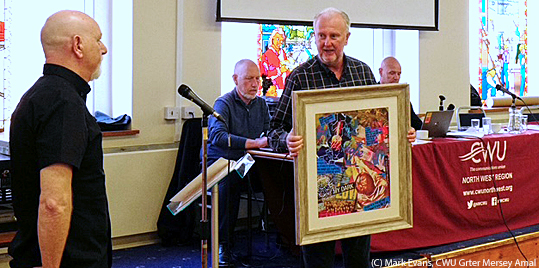

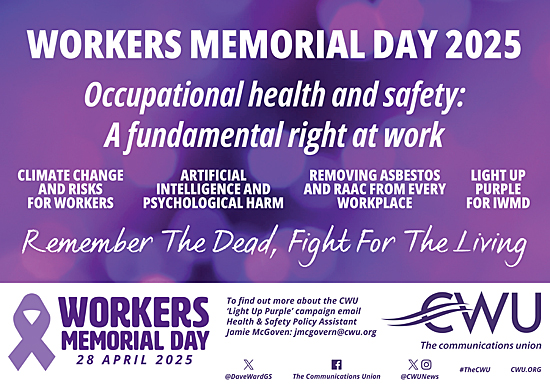
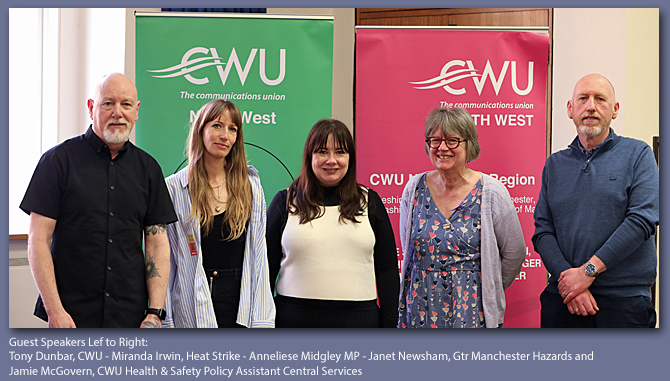
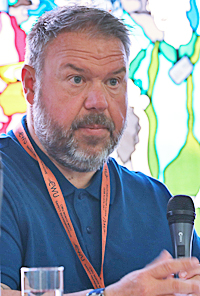 Mark Holt, then spoke, again welcoming the union safety reps present from both the union's constituencies of Postal and Telecoms and Financial Services (T&FS) and the Postal Constituency.
Mark Holt, then spoke, again welcoming the union safety reps present from both the union's constituencies of Postal and Telecoms and Financial Services (T&FS) and the Postal Constituency.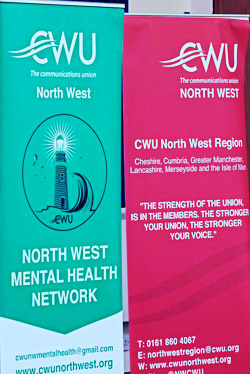 Mark ended this part of his speech saying:
Mark ended this part of his speech saying: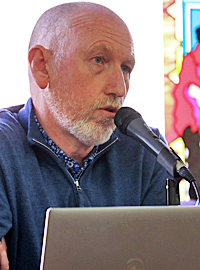 Jamie's other major issue that he has shown great passion for is that of addressing the situation, as mentioned by Mark, of the increasing number of dangerous dogs incidents, causing injuries, and even deaths.
Jamie's other major issue that he has shown great passion for is that of addressing the situation, as mentioned by Mark, of the increasing number of dangerous dogs incidents, causing injuries, and even deaths. So I mean I'll just go into a few of the emerging risks as we see it and you know they are pan CWU risks by the way because the new role I've got for the central services team is going to be pan CW looking at risks across all sectors and all industries and one of the first big risks that we're seeing now is and a challenge to us as a trade union by the way is to become more of an age sensitive trade union you know because if you look at the studies that are out there you know if the G7 group Britain is the worst in keeping people in work over the age of 55 you know and that is now becoming a real risk for us maintaining people in work over the age of 55 so we need to become more aid sensitive as a trade union and do more to support people as they're aging and as they're getting into the later years in the work and life.
So I mean I'll just go into a few of the emerging risks as we see it and you know they are pan CWU risks by the way because the new role I've got for the central services team is going to be pan CW looking at risks across all sectors and all industries and one of the first big risks that we're seeing now is and a challenge to us as a trade union by the way is to become more of an age sensitive trade union you know because if you look at the studies that are out there you know if the G7 group Britain is the worst in keeping people in work over the age of 55 you know and that is now becoming a real risk for us maintaining people in work over the age of 55 so we need to become more aid sensitive as a trade union and do more to support people as they're aging and as they're getting into the later years in the work and life.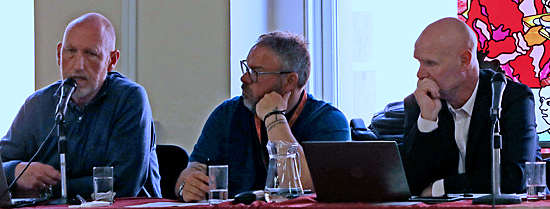 In Royal Mail we have to look at TFMS and look at the age sensitivity that they have because again you know we want to try and keep people in work longer and that's what people are telling us as a trade union, we want to stay in work longer but we don't want to actually collapse into retirement we want to ease into retirement so these schemes are something that we can certainly look at going forward.
In Royal Mail we have to look at TFMS and look at the age sensitivity that they have because again you know we want to try and keep people in work longer and that's what people are telling us as a trade union, we want to stay in work longer but we don't want to actually collapse into retirement we want to ease into retirement so these schemes are something that we can certainly look at going forward.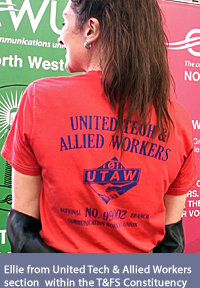 I'll explain how difficult it is for our college in UTAW because they are going into dealing with the employee who don't recognise unions and I've been speaking to Ellie from UTAW, and thankfully Ellie's here today. Give us a wave Ellie yeah and it's I just want to mention I think I always speak for everyone in this room, you know.
I'll explain how difficult it is for our college in UTAW because they are going into dealing with the employee who don't recognise unions and I've been speaking to Ellie from UTAW, and thankfully Ellie's here today. Give us a wave Ellie yeah and it's I just want to mention I think I always speak for everyone in this room, you know. 
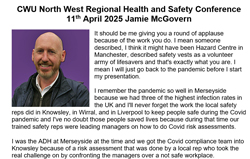
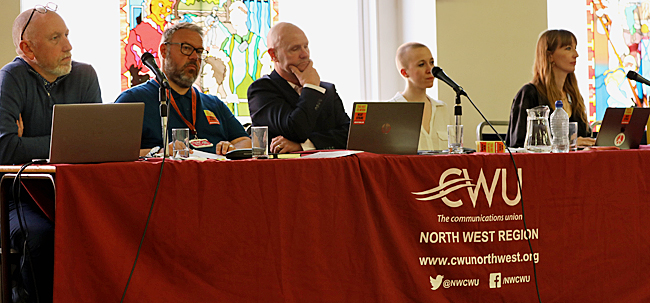
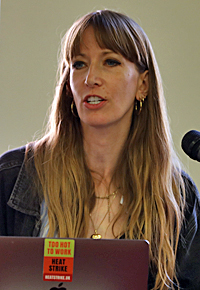
 They gave a small presentation, which included a couple of sessions of audience participation, which came as a surprise to many!
They gave a small presentation, which included a couple of sessions of audience participation, which came as a surprise to many!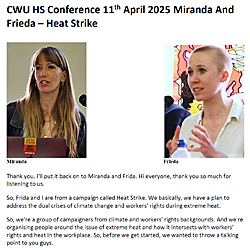 You're not allowed to leave your van unsecured. 5mm gap in the window. There's literally no point, is there? That much.
You're not allowed to leave your van unsecured. 5mm gap in the window. There's literally no point, is there? That much.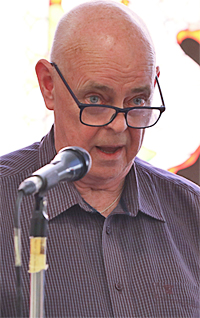 Derek Maylor began by giving some detail and context to the meeting of his history as a CWU member, Branch Officer and Chair of the BT Unions H&S Co-ord prior to his retirement from BT; and the work he did as Hospital Governor and now as a CWU retired member.
Derek Maylor began by giving some detail and context to the meeting of his history as a CWU member, Branch Officer and Chair of the BT Unions H&S Co-ord prior to his retirement from BT; and the work he did as Hospital Governor and now as a CWU retired member.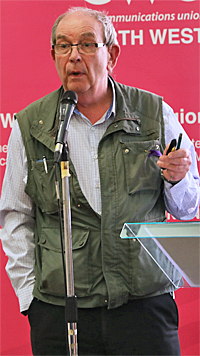 John Flanagan then spoke, going into detail about the diseases caused by breathing in minute particles of Asbestos dust, and the fact it takes up to 20 years for symptoms of the fatal disease to manifest itself in those who have been exposed to the substance.
John Flanagan then spoke, going into detail about the diseases caused by breathing in minute particles of Asbestos dust, and the fact it takes up to 20 years for symptoms of the fatal disease to manifest itself in those who have been exposed to the substance.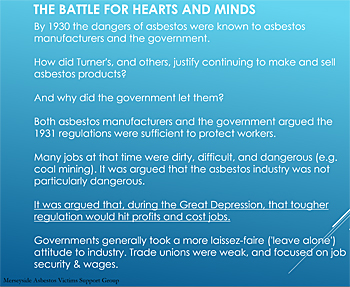 john went into further detail about the history of how the Asbestos ban came about, the political pressures across the world:
john went into further detail about the history of how the Asbestos ban came about, the political pressures across the world: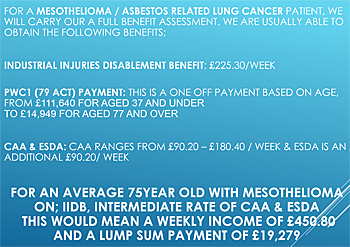 Can you imagine coming, somebody coming up to you and saying yeah I'm putting on this benefit and you'll get that lump sum, but it won't be here in 12 months or 18 months time, and that's the way you've got to look at those benefits, they're only there to make your last few months of your life a little bit more comfortable, and previous MPs, Governments have recognised that.
Can you imagine coming, somebody coming up to you and saying yeah I'm putting on this benefit and you'll get that lump sum, but it won't be here in 12 months or 18 months time, and that's the way you've got to look at those benefits, they're only there to make your last few months of your life a little bit more comfortable, and previous MPs, Governments have recognised that.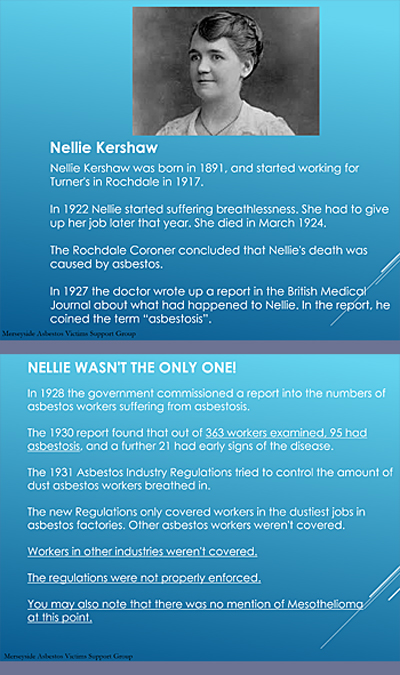 The Supreme Court, and that's where it ended up by the way, that's how Alderstadt was fighting the case, the Supreme Court granted the forum access to many of these documents which we have now made publicly available at Cape documents on the website, and that's available for 62 solicitors taking out of court for compensation etc.
The Supreme Court, and that's where it ended up by the way, that's how Alderstadt was fighting the case, the Supreme Court granted the forum access to many of these documents which we have now made publicly available at Cape documents on the website, and that's available for 62 solicitors taking out of court for compensation etc. 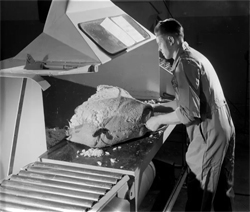 This is a photograph showing this photograph, because this was one of the promotional photographs by the asbestos industry showing that there's no asbestos in the workplace, right? If your nose is burned, it's as clear as a bell, isn't it? But it's really a subtle, yeah, it's fairly obvious that you know what they were starting to do with this. In 1982, you can see at the bottom of the page there, there was a documentary called Alice, A Fight for Life, and it was 40 minutes later in a moment, just before I finish, to show you what Alice, A Fight for Life was all about.
This is a photograph showing this photograph, because this was one of the promotional photographs by the asbestos industry showing that there's no asbestos in the workplace, right? If your nose is burned, it's as clear as a bell, isn't it? But it's really a subtle, yeah, it's fairly obvious that you know what they were starting to do with this. In 1982, you can see at the bottom of the page there, there was a documentary called Alice, A Fight for Life, and it was 40 minutes later in a moment, just before I finish, to show you what Alice, A Fight for Life was all about. 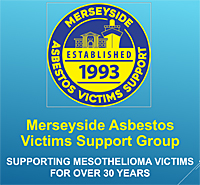 We said, because Liverpool was one of the main importation ports, from America, we said, why don't we decide to deal with America and say, oh, we only got a little bit of asbestos coming into the country, and we can manage that, et cetera, et cetera. In a way, breaking the ban on asbestos. So Steve Rotten, that's all you're probably aware of, he voted the minister at the time, James Dundee, Chairman of the Parliamentary or the Secretary of State, for exiting the European Union, as it was then.
We said, because Liverpool was one of the main importation ports, from America, we said, why don't we decide to deal with America and say, oh, we only got a little bit of asbestos coming into the country, and we can manage that, et cetera, et cetera. In a way, breaking the ban on asbestos. So Steve Rotten, that's all you're probably aware of, he voted the minister at the time, James Dundee, Chairman of the Parliamentary or the Secretary of State, for exiting the European Union, as it was then.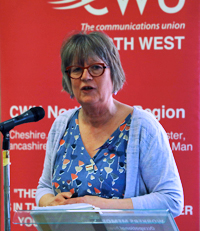
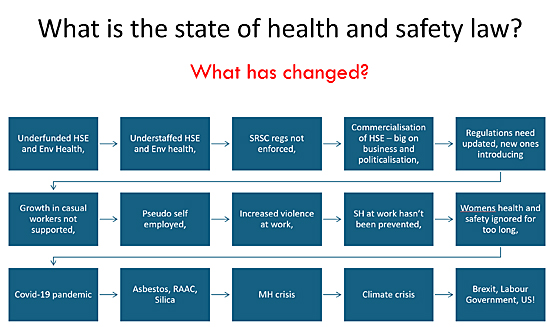 They followed that instruction. For the HSE, since 2010, the funding's been cut by 50%. They've 35% cuts in safety, 41% cuts in less inspectors.
They followed that instruction. For the HSE, since 2010, the funding's been cut by 50%. They've 35% cuts in safety, 41% cuts in less inspectors.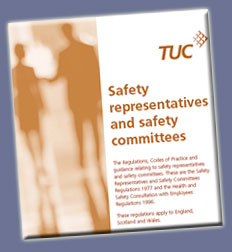
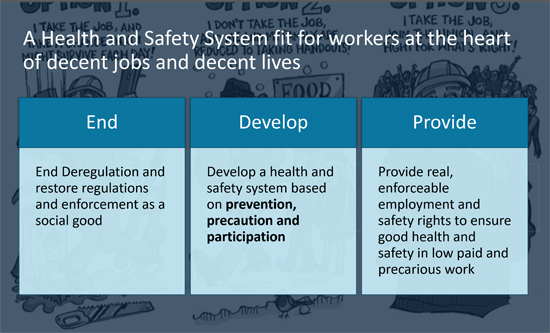 We've got four events coming up across the country in the next couple of months, and in May the 23rd in Manchester, we've got one on climate crisis, stroke, air pollution, in the Working-Class Movement Library, and really welcome you to sign up to that and join us.
We've got four events coming up across the country in the next couple of months, and in May the 23rd in Manchester, we've got one on climate crisis, stroke, air pollution, in the Working-Class Movement Library, and really welcome you to sign up to that and join us. 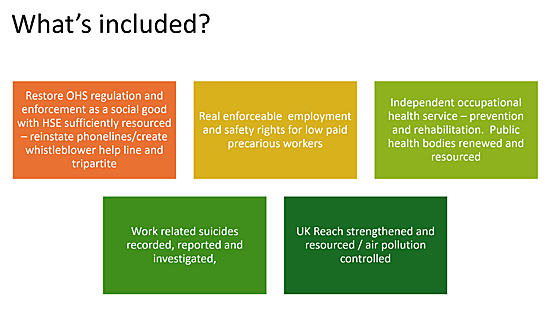 We produced something called the Manifesto, Decent Jobs and Decent Lives for the 2019 election. In it, there's a brilliant analysis, Hilda did it, and it's a brilliant analysis of our health and safety system. Have a look at it, because it tells you all about this, the way that our system, how it's developed, and where we've got to on it.
We produced something called the Manifesto, Decent Jobs and Decent Lives for the 2019 election. In it, there's a brilliant analysis, Hilda did it, and it's a brilliant analysis of our health and safety system. Have a look at it, because it tells you all about this, the way that our system, how it's developed, and where we've got to on it.  And he goes to work the next day and hangs himself in the local wood. And when it came up at the inquest, he'd been put in a cage. They poured lighter fluid on him, set him alight. They held him down. They'd beaten his leg till he limped. And he got more banter as a result of the employer, of the parents going to see the employer.
And he goes to work the next day and hangs himself in the local wood. And when it came up at the inquest, he'd been put in a cage. They poured lighter fluid on him, set him alight. They held him down. They'd beaten his leg till he limped. And he got more banter as a result of the employer, of the parents going to see the employer. 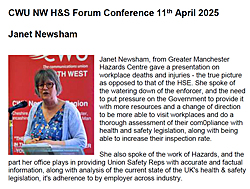 And health and safety is absolutely key, I think, in what we can do. And if you get a chance, please come to the Hazards Conference, 5th and 7th of September at Keele University. It is a brilliant experience for you.
And health and safety is absolutely key, I think, in what we can do. And if you get a chance, please come to the Hazards Conference, 5th and 7th of September at Keele University. It is a brilliant experience for you. 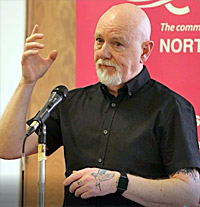 He described his mental health in the form of a photograph, taken of him by his ex-wife, of him laying on the steps of a derelict church in an alcoholic stupour. Calling it "the puddle of a man" and a 'Dark Shadow sitting on his right shoulder' daily:
He described his mental health in the form of a photograph, taken of him by his ex-wife, of him laying on the steps of a derelict church in an alcoholic stupour. Calling it "the puddle of a man" and a 'Dark Shadow sitting on his right shoulder' daily: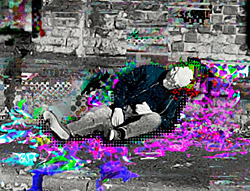 This is me, after a serious session in a pub. I walked outside, got about 50 yards away, and collapsed unconscious. Previous to this, I'd walked outside, fell over, broke one collarbone. A couple months later, I walked outside, fell over, broke the other collarbone, and broke my left shoulder as well. All was driven, driven by depression. That is my lowest point though.
This is me, after a serious session in a pub. I walked outside, got about 50 yards away, and collapsed unconscious. Previous to this, I'd walked outside, fell over, broke one collarbone. A couple months later, I walked outside, fell over, broke the other collarbone, and broke my left shoulder as well. All was driven, driven by depression. That is my lowest point though.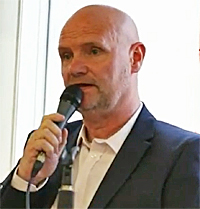 John McMurray, Chairperson:
John McMurray, Chairperson: